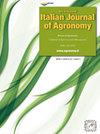化感菌与化学除草剂对野生燕麦侵染下小麦可持续生产的协调影响
IF 2.1
3区 农林科学
Q1 AGRONOMY
引用次数: 1
摘要
杂草是小麦生产的主要限制因素之一。为此,进行了化感菌与减量化学除草剂相结合的研究,以期在野生燕麦肆虐地区实现小麦的可持续生产。在无菌条件下,将产氰假单胞菌与两种化学除草剂(Axial和Atlantis)分别以25%和50%推荐剂量进行组合施用。结果表明,C4组合显著降低了50%轴向野生燕麦的生长发育,而提高了小麦的生长发育。然后,选择C4组合和轴向除草剂进行田间评价,在75%轴向下,C4组合可降低野生燕麦的杂草密度(82.1%)、SPAD值(26.0%)和籽粒产量(88.2%);在50%轴向下,C4组合可降低野生燕麦的相对野生燕麦密度(70.9%)、光合速率(26.6%)和蒸腾速率(25.6%)。而C4组合提高了75%轴向下小麦的SPAD值(26.9%)、茎长(10.1%)、分蘖(33.3%)、生物产量(32.7%)、秸秆产量(24.4%)、籽粒产量(46.8%)、蒸腾速率(9.6%)和气孔导度(14.7%)。在50%和75%的轴向处理下,小麦的生长和产量增幅与C4相当。综上所述,化感菌可在50%轴向条件下用于野生燕麦下的小麦可持续生产。本文章由计算机程序翻译,如有差异,请以英文原文为准。
Harmonious impacts of allelopathic bacteria with chemical herbicides for sustainable production of wheat (Triticum aestivum L.) under wild oat (Avena fatua L.) infestation
Weeds are one of the major limiting factors for wheat production. So, a study was conducted to integrate allelopathic bacteria with reduced dose of chemical herbicide for sustainable wheat production in wild oat infestation. Cyanide-producing Pseudomonas strains were applied in four combinations with and without two chemical herbicides (Axial and Atlantis) at 25% and 50% recommended dose under axenic conditions. Results showed that C4 combination significantly reduced growth and development of wild oat under 50% Axial while increase wheat growth. Afterward, C4 combination and Axial herbicide were selected for field evaluation, where it reduced the weed density (82.1%), SPAD value (26.0%) and grain yield (88.2%) under 75% Axial, and relative wild oat density (70.9%), photosynthetic rate (26.6%) and transpiration rate (25.6%) under 50% Axial in wild oat. While C4 combination improved SPAD value (26.9%), shoot length (10.1%), tillering (33.3%), biological yield (32.7%), straw yield (24.4%), grain yield (46.8%), transpiration rate (9.6%) and stomatal conductance (14.7%) in wheat under 75% Axial. The increase in growth and yield of wheat was found at par with C4 under 50% and 75% Axial. Thus, it is concluded that allelopathic bacteria could be used with 50% Axial for sustainable wheat production under wild oat.
求助全文
通过发布文献求助,成功后即可免费获取论文全文。
去求助
来源期刊

Italian Journal of Agronomy
AGRONOMY-
CiteScore
4.20
自引率
4.50%
发文量
25
审稿时长
10 weeks
期刊介绍:
The Italian Journal of Agronomy (IJA) is the official journal of the Italian Society for Agronomy. It publishes quarterly original articles and reviews reporting experimental and theoretical contributions to agronomy and crop science, with main emphasis on original articles from Italy and countries having similar agricultural conditions. The journal deals with all aspects of Agricultural and Environmental Sciences, the interactions between cropping systems and sustainable development. Multidisciplinary articles that bridge agronomy with ecology, environmental and social sciences are also welcome.
 求助内容:
求助内容: 应助结果提醒方式:
应助结果提醒方式:


